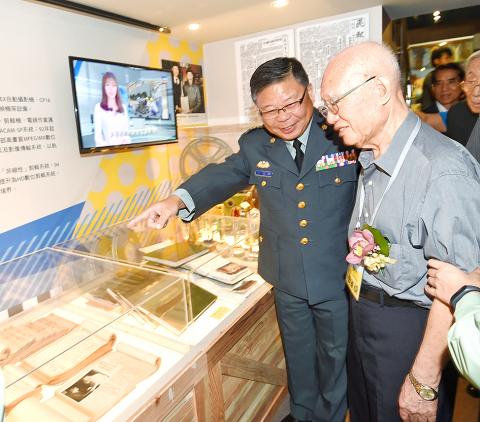Taiwan intends to take advantage of an annual defense conference with the US that was to open yesterday in Princeton, New Jersey, to seek Washington’s support for arms sales and cooperation opportunities with US defense companies, sources said.
Taiwan will seek backing for its weapons procurement proposals and cooperation with US defense manufacturers at the three-day US-Taiwan Defense Industry Conference, a source with direct knowledge of the matter said on condition of anonymity.
The efforts are necessary at a time when US President Donald Trump’s administration has yet to respond to Taipei’s request to purchase Lockheed Martin F-35 jets, or deliver on former US president George W. Bush’s pledge to sell the nation eight diesel-electric submarines, the source said.

Photo: Fang Pin-chao, Taipei Times
The US Department of State is expected to send officials “of some weight” to the conference, who are likely to meet with a Taiwanese delegation on the sidelines to talk about weapons procurement, the source added.
The conference is to focus on the US administration’s Northeast Asia policies and their potential effects on Taiwan’s defense.
It would also discuss the threats facing Taiwan and its response options, as well as how the nation could exploit China’s weaknesses in traditional and emerging domains — air, land, sea and cyberspace — according to information on the conference’s Web site.
Now in its 16th year, the conference is considered an important platform for dialogue on Taiwan’s national security needs, weapons procurement and defense cooperation with the US.
The Taiwanese delegation to the three-day conference is led by Deputy Defense Minister General Chang Guan-chung (張冠群), who is to deliver a keynote speech today.
Chang is scheduled to speak after introductory remarks by American Institute in Taiwan Chairman James Moriarty.
US Principal Deputy Assistant Secretary of Defense for Asian and Pacific Security Affairs David Helvey is also to give a keynote speech later in the day.
The discussions at the conference are to include input by Ian Easton, research fellow at US-based think tank Project 2049 Institute and author of The Chinese Invasion Threat.
Business representatives from Taiwan’s information security, shipbuilding and aviation industries are to join the discussions tomorrow.
The participants are to examine the potential implications of the Trump administration’s policies for developing business opportunities in the defense and security industries in Taiwan and the US.
The conference has been hosted by the US-Taiwan Business Council since 2002.

AGING: As of last month, people aged 65 or older accounted for 20.06 percent of the total population and the number of couples who got married fell by 18,685 from 2024 Taiwan has surpassed South Korea as the country least willing to have children, with an annual crude birthrate of 4.62 per 1,000 people, Ministry of the Interior data showed yesterday. The nation was previously ranked the second-lowest country in terms of total fertility rate, or the average number of children a woman has in her lifetime. However, South Korea’s fertility rate began to recover from 2023, with total fertility rate rising from 0.72 and estimated to reach 0.82 to 0.85 by last year, and the crude birthrate projected at 6.7 per 1,000 people. Japan’s crude birthrate was projected to fall below six,

Conflict with Taiwan could leave China with “massive economic disruption, catastrophic military losses, significant social unrest, and devastating sanctions,” a US think tank said in a report released on Monday. The German Marshall Fund released a report titled If China Attacks Taiwan: The Consequences for China of “Minor Conflict” and “Major War” Scenarios. The report details the “massive” economic, military, social and international costs to China in the event of a minor conflict or major war with Taiwan, estimating that the Chinese People’s Liberation Army (PLA) could sustain losses of more than half of its active-duty ground forces, including 100,000 troops. Understanding Chinese

US President Donald Trump in an interview with the New York Times published on Thursday said that “it’s up to” Chinese President Xi Jinping (習近平) what China does on Taiwan, but that he would be “very unhappy” with a change in the “status quo.” “He [Xi] considers it to be a part of China, and that’s up to him what he’s going to be doing, but I’ve expressed to him that I would be very unhappy if he did that, and I don’t think he’ll do that. I hope he doesn’t do that,” Trump said. Trump made the comments in the context

SELF-DEFENSE: Tokyo has accelerated its spending goal and its defense minister said the nation needs to discuss whether it should develop nuclear-powered submarines China is ramping up objections to what it sees as Japan’s desire to acquire nuclear weapons, despite Tokyo’s longstanding renunciation of such arms, deepening another fissure in the two neighbors’ increasingly tense ties. In what appears to be a concerted effort, China’s foreign and defense ministries issued statements on Thursday condemning alleged remilitarism efforts by Tokyo. The remarks came as two of the country’s top think tanks jointly issued a 29-page report framing actions by “right-wing forces” in Japan as posing a “serious threat” to world peace. While that report did not define “right-wing forces,” the Chinese Ministry of Foreign Affairs was